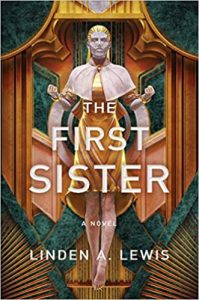Katharine Coldiron Reviews The First Sister by Linden A. Lewis
 The First Sister, Linden A. Lewis (Skybound 978-1-98212-699-5, $26.00, 352pp, hc) August 2020.
The First Sister, Linden A. Lewis (Skybound 978-1-98212-699-5, $26.00, 352pp, hc) August 2020.
I genuinely wanted to like and to root for Linden A. Lewis’s debut, and the inaugural book in a trilogy, The First Sister. As I read, though, the book dissolved more and more of my goodwill, until, by the conclusion, I had very few positive things left to say. Lewis presents a new science fiction universe, but she’s a poor historian of that universe, leaving the reader confused about important aspects of its origin. She invents diverse characters in difficult, conflict-ridden situations, but their personalities are almost blank, their narrative voices interchangeable. She creates a twisty, interlocking plot, but its final switchbacks strain credulity. It’s a book that just barely misses the mark at nearly all its levels, and is thus a frustrating experience.
The book is narrated by three characters: First Sister, a woman in an order of holy courtesans, trafficked by a governing religious body to serve soldiers in an ongoing war; Lito, a specialized warrior on the other side of the war from First Sister; and Hiro, a prodigal child to the most important (and ruthless) technology czar in a highly technological society. Hiro narrates their portions of the story through an audio database they’ve left behind for Lito, their former partner, before vanishing. The story involves these three people recognizing the destructive and corrupt systems that entrap them, and pledging to destroy them via infiltration, subversion, and murder. The action takes place on the Juno, a spaceship stolen from the tech-worshipping Icarii by the more religious Geans, and variously on Mars, Venus, Mercury, and the dwarf planet Ceres. There’s also an oppressed post-human species, the Asters. It is unclear whether Earth is still populated, and whether the Icarii and the Geans come from different factions of Earthlings or one group comes from Mars while the other comes from Earth, etc. Lewis is competent at worldbuilding, to be sure, but historical aspects of this world remain fuzzy, which sows confusion for the reader.
Although First Sister is theoretically the most important subject of the book, given its title, she is both the least likable and the most thinly written character. She is naïve and self-centered, and these would be interesting flaws to overcome, except that she does so all at once, at the end, rather than over time and through a compelling journey. A lot of First Sister’s characterization comes from the audience being maneuvered to pity her, for both her situation (forced sex work) and her incapacity to understand power dynamics. Lito is a bit more nuanced, having made choices and regretted them, and having a sense of pride in his profession, murderous though it may be. He laments his lost partner, Hiro, in a unique way; it’s difficult to find literary portrayals of non-romantic love that nevertheless feels like true love, and Lewis has created that between Lito and Hiro rather deftly. Lito’s up-from-the-gutter story and Hiro’s rebellious-rich-kid story both deal in cliché in a disappointing way, though.
In the final chapters, two plot twists that evoke both Fight Club and Shakespeare completely overturn the reader’s understanding of two critical supporting characters. I think we are supposed to find these twists cool and character-enriching, but I found them painful and almost silly, especially when considered together. These twists simplify things for the author, but at the expense of the reader, and particularly her suspension of disbelief. Had The First Sister been stronger throughout, these surprises would have been easier to absorb. But because Lewis’s characterization and the historical aspects of her worldbuilding are weak, I felt sure I was in the hands of a writer who didn’t know what she was doing, rather than a writer who was taking worthwhile risks.
Truly, I hope that Lewis’s craft improves, because there’s always room on the shelf for a science fiction newcomer with interest in gender issues and power struggles, but The First Sister is an unready book, a novel with fewer merits than demerits, and an unfortunate start to a new author’s career.
Katharine Coldiron is the author of Ceremonials (Kernpunkt Press), an SPD fiction bestseller. Her work as a book critic has appeared in The Washington Post, The Believer, The Guardian, and many other places. She lives in California and at kcoldiron.com.
This review and more like it in the January 2021 issue of Locus.
 While you are here, please take a moment to support Locus with a one-time or recurring donation. We rely on reader donations to keep the magazine and site going, and would like to keep the site paywall free, but WE NEED YOUR FINANCIAL SUPPORT to continue quality coverage of the science fiction and fantasy field.
While you are here, please take a moment to support Locus with a one-time or recurring donation. We rely on reader donations to keep the magazine and site going, and would like to keep the site paywall free, but WE NEED YOUR FINANCIAL SUPPORT to continue quality coverage of the science fiction and fantasy field.
©Locus Magazine. Copyrighted material may not be republished without permission of LSFF.







My god I didn’t know you could read the first book in a series without reading the second one. I thought we directly reviewed the second book here. I’m shocked . Trilogy means a group of three related novels. RELATED. There is a structure and an order
. Trilogy means a group of three related novels. RELATED. There is a structure and an order